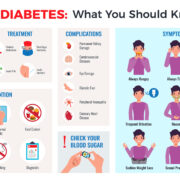Managing Type 2 diabetes mellitus (T2DM) involves more than just medication; it requires a holistic approach to health education. A comprehensive diabetes self-management education (DSME) program is crucial for all newly diagnosed individuals. This program should include nutrition, eating patterns, physical activity, optimization of metabolic control, and complication prevention. Although weight reduction through diet, exercise, and behavioural modification can enhance glycemic management, medication is often necessary for most patients with type 2 diabetes.
Personalized Glycemic Targets
For patients with T2DM, glycated haemoglobin (A1C) levels should be tailored to individual needs. This personalization involves balancing the expected reduction in long-term complications with the immediate risks of hypoglycemia and other treatment side effects. A reasonable therapeutic goal for most patients is an A1C value of ≤7 per cent (53.0 mmol/mol). However, higher glycemic targets may be appropriate for older adults or those with other health conditions or a limited life expectancy due to the reduced likelihood of benefiting from intensive therapy.
Medical Nutrition Therapy (MNT)
Medical nutrition therapy (MNT) is essential in diabetes management and self-management education. It involves creating a dietary plan based on medical, lifestyle, and personal factors. The primary goals of MNT are to avoid weight gain, maintain consistency in carbohydrate intake, and ensure balanced nutritional content. For many patients, MNT aims to achieve body weight reduction.
Weight Management Strategies
In addition to glycemia, body weight management should be a therapeutic target for patients with T2DM. Effective weight management involves counselling on dietary changes and physical activity to achieve weight loss or prevent weight gain. Weight loss helps improve glycemia by reducing insulin resistance and impaired beta cell function, two key metabolic disturbances in T2DM. Weight maintenance can be an alternative goal for patients struggling to lose weight.
Lifestyle Change as the Initial Approach
Lifestyle change, encompassing diet, physical activity, and behaviour modification, is vital for any weight management plan. It is the initial approach to body weight reduction, with pharmacologic therapy and metabolic surgery reserved for those who do not achieve their targeted weight loss through lifestyle changes alone. Recommendations should be tailored to the patient’s goals and preferences, emphasising “intensive” lifestyle modification for highly motivated individuals.
Dietary Modifications

A diagnosis of T2DM often motivates lifestyle changes, with dietary modification being a highly effective strategy for weight loss and glycemic management. The benefits of nutritional changes extend beyond weight loss, improving metabolic health and managing hypertension. Glycemic improvement is linked to the degree of caloric restriction and weight reduction, with a 5 to 10 per cent weight loss also potentially alleviating metabolic dysfunction-associated steatohepatitis, sleep apnea, and other T2DM comorbidities. To manage glycemia and weight and reduce the risk of cardiovascular disease and fatty liver, patients should avoid sugar-sweetened beverages, including natural fruit juice.
Pharmacologic Therapy
Pharmacotherapy targeted at weight management is effective for patients with T2DM. Metformin, commonly used to manage hyperglycemia, also promotes modest weight loss. For patients aiming for significant body weight reduction, medications that promote weight loss and lower glucose, such as glucagon-like peptide 1 (GLP-1) receptor and dual GLP-1 and glucose-dependent insulinotropic polypeptide (GIP) agonist therapies, are recommended. These medications are added sequentially to metformin to achieve additional glucose lowering or weight loss.
Surgical Therapy
Weight loss surgery offers the most significant degree of sustained weight loss and improvement in blood glucose management for patients with obesity and T2DM. It also results in frequent sustained remissions of diabetes. Surgery is an option for treating poorly managed T2DM when other modalities have failed.
Exercise and Physical Activity

Regular exercise benefits T2DM patients by improving glycemic management and insulin sensitivity. It can also delay the progression from impaired glucose tolerance to overt diabetes. The benefits of exercise are directly related to physical activity, though weight reduction is also a contributing factor. However, maintaining a regular exercise regimen can be challenging, with only 50 per cent of T2DM patients achieving this.
Recommended Exercise Types
- Aerobic Exercise: Adults with diabetes should decrease sedentary time and perform 30 to 60 minutes of moderate-intensity aerobic activity on most days of the week, totalling at least 150 minutes of moderate-intensity aerobic exercise per week. This exercise should be spread over at least three days per week, with no more than two consecutive days without exercise. Shorter-duration, intensive exercise may be suitable for physically fit individuals.
- Resistance Training: In the absence of contraindications such as moderate to severe proliferative retinopathy or severe coronary artery disease, patients with T2DM should engage in resistance training (exercise with free weights or weight machines) at least twice weekly. Resistance training is particularly important for individuals with T2DM who are not overweight or obese, as relative sarcopenia may contribute to diabetes pathophysiology.
Intensive Lifestyle Modification
Intensive behavioural modification interventions focusing on weight reduction and increased activity levels can significantly reduce weight and improve glycemic management in patients with established T2DM. These interventions also reduce the need for glucose-lowering and other medications.
Psychological Interventions
Patients with T2DM often experience significant stress, known as diabetes distress, due to the many self-care responsibilities required for glycemic management. Concurrent depression can also interfere with self-care. Psychotherapy can reduce psychological distress and improve glycemic management in some patients, though results may vary.
Pregnancy Planning for Women with Diabetes
All women of childbearing age with diabetes should receive counselling on the potential effects of diabetes and commonly used medications on maternal and fetal outcomes. They should also be informed about the potential impact of pregnancy on their diabetes management and any existing complications.
Conclusion
Effective management of Type 2 Diabetes Mellitus requires a comprehensive approach that includes personalized glycemic targets, medical nutrition therapy, weight management strategies, dietary modifications, pharmacologic therapy, surgical options, regular exercise, intensive lifestyle modification, psychological support, and pregnancy planning. By addressing these aspects, patients with T2DM can achieve better glycemic control, reduce complications, and improve their overall quality of life.
Frequently Asked Questions (FAQ) About Managing Type 2 Diabetes Mellitus
Q1: What is Type 2 Diabetes Mellitus (T2DM)? A1: Type 2 Diabetes Mellitus is a chronic condition affecting how your body processes blood sugar (glucose). It is characterized by insulin resistance and impaired insulin production.
Q2: Why is diabetes self-management education (DSME) important? A2: DSME helps individuals understand their condition, manage blood sugar levels, make informed decisions about nutrition and physical activity, and prevent complications.
Q3: What are personalized glycemic targets? A3: Personalized glycemic targets are individualized blood sugar goals set by your healthcare provider based on your age, health status, and risk factors to balance long-term complication prevention and immediate treatment side effects.
Q4: What is Medical Nutrition Therapy (MNT)? A4: MNT involves creating a personalized dietary plan to manage diabetes, focusing on balanced nutrition, consistent carbohydrate intake, and weight management to improve glycemic control.
Q5: How does weight management affect diabetes? A5: Effective weight management can reduce insulin resistance and improve blood sugar control. Strategies include lifestyle changes, diet, physical activity, pharmacologic therapy, and in some cases, metabolic surgery.
Q6: What dietary changes are recommended for managing T2DM? A6: Key dietary changes include reducing calorie intake, avoiding sugar-sweetened beverages, and maintaining consistent carbohydrate intake to manage blood sugar levels and weight.
Q7: What role does exercise play in managing T2DM? A7: Regular exercise improves insulin sensitivity, helps manage blood sugar levels, and can delay the progression of diabetes. It includes both aerobic exercise and resistance training.
Q8: What pharmacologic therapies are available for T2DM? A8: Common medications include metformin, GLP-1 receptor agonists, and dual GLP-1 and GIP agonists. These medications help lower blood sugar levels and promote weight loss.
Q9: When is weight loss surgery considered for T2DM patients? A9: Weight loss surgery is considered for patients with obesity and poorly managed T2DM when other treatment modalities have failed. It offers significant and sustained weight loss and improved glycemic control.
Q10: How can psychological support help in managing diabetes? A10: Psychological support, including psychotherapy, can help reduce diabetes distress and depression, improving self-care and glycemic management.
Q11: What should women with T2DM consider when planning a pregnancy? A11: Women with T2DM should consult their healthcare provider to understand the effects of diabetes and medications on pregnancy and to manage their condition and any existing complications effectively.
Q12: How can intensive lifestyle modification benefit T2DM patients? A12: Intensive lifestyle modification focusing on weight reduction and increased physical activity can significantly improve glycemic control and reduce the need for medication.
Q13: What are the complications of untreated or poorly managed T2DM? A13: Complications include cardiovascular disease, kidney damage, nerve damage, eye problems, and increased risk of infections.
Q14: How often should I monitor my blood sugar levels? A14: Your healthcare provider will recommend how frequently you should check your blood sugar levels based on your treatment plan, which may vary daily to several times daily.
Q15: Can Type 2 Diabetes Mellitus be reversed? A15: While there is no cure, T2DM can be managed effectively, and some individuals may achieve remission through significant lifestyle changes, weight loss, and, in some cases, metabolic surgery.






